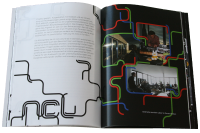By Michel Bauwens
Keynote speaker at the net culture labs opening events (19 & 21 June 2007).
The net culture labs in Vienna and Dornbirn answer to a very real social need, which goes much beyond this local initiative.
The context for this claim is the following.
Next to our market economy, a new economy is arising which no longer exclusively is geared towards monetization. As the threshold of cooperation in globally coordinated networks of individuals and small groups goes lower and lower, the direct social production of all kinds of use value is enabled. Either through the sharing economy taking place over the (proprietary) Web 2.0 platforms, through the commons-oriented production of communities such as Linux and Wikipedia (usually surrounded by an ecology of for-profit enterprises), or through the crowdsourcing based participation of users within the value chains of brands and corporations. At present, a relative minor part of this massive value creation is being transformed into monetizable exchange value, which is not only a problem for for-profit entities, but for peer producers themselves.
This has a number of important effects.
Innovation is becoming social, i.e. becoming an emerging property of the entire social field of networks, rather than an internal characteristic of for-profit institutions. The solely entrepreneurial vision of innovation is therefore superseded.
While increasing social value is being created directly, related with but also outside the market mechanisms, there is a resulting crisis of value, i.e. an increased disconnect between value creation and value capture. Large parts of the new peer economy are not being monetized, and probably never will.
Therefore, society and the market players are increasingly benefiting from the positive externalities of social cooperation, but we lack an efficient return mechanism
Peer production projects might be collectively sustainable, but the individuals involved in passionate and creative production still need to sustain themselves.
Hence a crisis of precarity, of which creative professionals are not just the victim, but it is also often times a matter of choice, with paid employment becoming a means for the more meaningful passionate value creation.
What can be done?
For-profit entities can start supporting, either the commons or communities from which they are benefiting, or social innovation more generally, since it is the pool from which value is created. The support of the net culture labs, as a space for open collaboration and a posteriori privileged access to potential further investment, is a good step in that direction.
Public authorities can also evolve towards a Partner State model, whereby they can enable and empower direct social production and social innovation. The evolving Transitional Labour Market policies which are evolving in Europe to take into account the mobility of contemporary workers, need to be enriched with an understanding that the periods of non-work, are potentially such as creative, necessary, and socially useful than the episodes of paid employment.
The peer producers themselves can also directly organize their interface with the market, and they can do this be following principles of equity and transparency, which are directly in tune with the underlying values of peer production. Of this, the osAlliance itself is a pioneering model.
More information about the Crisis of Value in the emerging Ethical Economy can be found in this landmark essay by Adam Arvidsson here.
A response, written from within the net culture lab at Dornbirn, is the Dornbirn Manifesto by Michel Bauwens.
Similar initiatives will be monitored at p2pfoundation.net through specific pages dedicated to Partner State based policy making.
Tags: Uncategorized

 Die komplette Dokumentation auf 130 Seiten bekommst du um EUR 15,40 als Buch
Die komplette Dokumentation auf 130 Seiten bekommst du um EUR 15,40 als Buch 
1 comment
Comments feed for this article
Trackback link
http://lab.netculture.at/mission-statement/trackback/
09092 at 11:56
Pingback from net culture lab · CC Alps Salon zu “Open Everything” am 11.9. im MQ